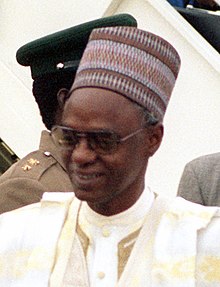| Office | Minister | Notes ' |
|---|
| President | Shehu Shagari | 1979–83 |
| Vice-president | Alex Ifeanyichukwu Ekwueme | 1979–83 |
| Agriculture | Ibrahim Gusau | December 1979 – February 1982 |
| Adamu Ciroma | February 1982 – October 1983 |
| Attorney General and Justice | Richard Akinjide | December 1979 – October 1983 |
| Aviation | Samuel Mafuyai | December 1979 – February 1982 |
| John Kadiya | February 1982 – October 1983 |
| Commerce | Isaac Shaahu | December 1979 – February 1982 |
| Bello Maitama Yusuf | February 1982 – October 1983 |
| Communications | Akanbi Oniyangi | December 1979 – February 1982 |
| Audu Innocent Ogbeh | February 1982 – October 1983 |
| Defence | Iya Abubakar | December 1979 – February 1982 |
| Akanbi Oniyangi | February 1982 – October 1983 |
| Education | I. C. Madubuike | December 1979 – February 1982 |
| Sylvester Ugoh | February 1982 – October 1983 |
| Employment, Labor and Productivity | Adebisi Ogedengbe | December 1979 – February 1982 |
| Emmanuel Osanmor | February 1982 – October 1983 |
| External Affairs | Ishaya Audu | December 1979 – October 1983 |
| Emeka Anyaoku | 1983 |
| Federal Capital Territory | John Kadiya | December 1979 – February 1982 |
| Abubakar Iro Danmusa | February 1982 – October 1983 |
| Finance & Works | Sunday Essang | December 1979 – October 1983 |
| Health | D. C. Ugwu | December 1979 – October 1983 |
| Housing (and Environment from 1981) | Wahab Dosunmu | December 1979 – February 1982 |
| Ahmed Musa | February 1982 – October 1983 |
| Industries | I. J. Igbani | December 1979 – October 1983 |
| Information | Garba Wushishi | February 1982 – October 1983 |
| Internal Affairs | Maitama Bello Yusuf | December 1979 – 1981 |
| Janet Akinrinade | (Minister of State) December 1979 – October 1983 |
| Iya Abubakar | 1981–1982 |
| Ali Baba | (Minister of State)1981 – 1982 |
| Ali Baba | 1982 – 1983 [14] |
| Mines and Power | Mohammed Hassan | December 1979 – October 1983 External Affairs II | October 1983 - 31 December 1983 |
| National Planning | Ebun Oyagbola | December 1979 – October 1983 |
| Police Affairs | Emmanuel Osanmor | December 1979 – February 1982 |
| Ndagi Mahmudu | February 1982 – October 1983 |
| Public Works & Finance | Victor Masi | December 1979 – October 1983 |
| Science and Technology | Sylvester Ugoh | December 1979 – February 1982 |
| Wahab Dosunmu | February 1982 – October 1983 |
| Social Welfare, Youth, Sports (to 1982) and Culture | Paulinus Amadike | December 1979 – February 1982 |
| Sports Development | Adebisi Ogedengbe | February 1982 – October 1983 |
| Steel Development | Paul Unongo | (MOS) December 1979 – February 1982 |
| Mamman Makele | February 1982 – October 1983 |
| Transport | Umaru Dikko | December 1979 – October 1983 |
| Water Resources | Ndagi Mahmudu | December 1979 – February 1982 |
| E. Y. Atanu | February 1982 – October 1983 |

